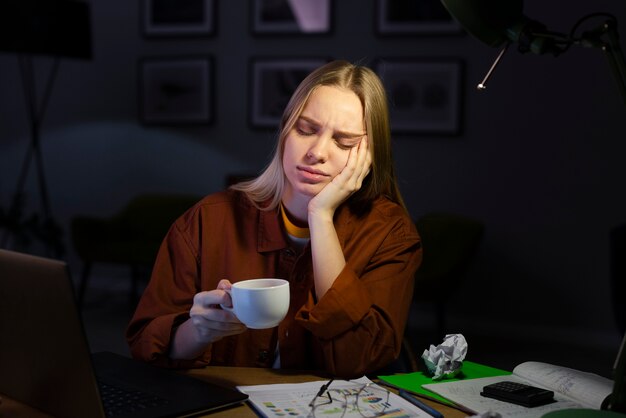The fast-paced environment of today causes anxiety in many people, making it a common occurrence in their everyday lives. Whether stress is brought on by demands at work, personal relationships, or other factors, stress management is crucial to preserving general well-being. Thankfully, there are several practical techniques that people may use to manage their anxiety and live more balanced lives.
Key takeaways:
- Gaining a deeper understanding of standard anxiety management techniques.
- Integrating coping strategies into daily life for better mental well-being.
- Seeking the benefits of professional support through resources like online anxiety treatment.
The Fundamentals of Anxiety
Anxiety is more than a fleeting worry or fear; for many, it can be a persistent challenge that affects everyday functioning. At its core, the body’s natural response to stress activates the ‘fight or flight’ instinct designed for survival. Common symptoms that indicate an anxious state might include an accelerated heartbeat, excessive sweating, restlessness, or fatigue. Some might experience gastrointestinal problems or difficulty concentrating. Given its multifaceted nature, understanding anxiety in its entirety is crucial for individuals looking to manage their symptoms effectively and maintain control over their mental well-being.
Identifying Triggers and Symptoms
Anxiety may often be like an unwanted guest who shows up uninvited and stays far longer than expected. With the use of online anxiety treatment, it is crucial to identify the precise circumstances that cause these emotions to manage stress more effectively. Some people find that rugged work surroundings, social situations, or personal triggers like health-related anxieties can cause anxiety. Symptoms often manifest in emotional and physical forms, ranging from a sense of impending doom to tangible issues like headaches or digestive discomfort. Recognizing these triggers and symptoms is akin to mapping the terrain of one’s mental landscape, which is a vital step towards navigating through the often complex world of anxiety management.
Self-Help Techniques for Anxiety Relief
In the anxiety management toolkit, self-help techniques are handy multitools that can be used anytime, anywhere. They often include mindfulness exercises, such as meditation or focused breathing, which help center the mind and divert it from spiraling thoughts. Breathing techniques, specifically, can act like a brake pedal for the mind, slowing down the racing thoughts associated with anxiety. Regular physical activity is another formidable strategy; it is a natural and effective anti-anxiety treatment that releases endorphins and burns off excess energy and tension. These self-help strategies can be employed discreetly and independently, offering a sense of empowerment over one’s mental state.
Creating a Supportive Environment
The adage that ‘no man is an island’ rings especially true regarding mental health. Crafting a supportive environment is pivotal to managing anxiety. It may revolve around cultivating relationships with friends and family who are understanding and can provide a listening ear or much-needed reassurance during heightened periods of stress. It can also involve shaping personal spaces to reflect tranquility and calmness through soothing colors, pleasant aromas, or decluttering. These environmental factors play a subtle yet powerful role in nurturing mental wellness and offering solace in times of anxiety.
Diet and Lifestyle Adjustments
What we put into our bodies can profoundly impact our mental state. A nutritious, well-balanced diet can be a solid foundation for lessening the grip of anxiety. Omega-3 fatty acid-rich foods, such as certain fish and nuts, may help to promote mental health. Similarly, a lifestyle that prioritizes adequate sleep and includes routine physical activity can significantly elevate mood and reduce anxiety symptoms. These adjustments may not provide an overnight cure, but they can form the building blocks of a solid strategy against anxiety over time.
When to Seek Professional Help
Anxiety, when left unchecked, can grow and overwhelm an individual’s ability to cope using self-help methods alone. It is when professional help, such as therapy or counseling, can become an invaluable resource. Therapists and counselors are trained to help individuals understand their anxiety, develop personalized coping mechanisms, and provide guidance on the road to recovery. Being proactive about one’s mental health and seeking assistance might be the most straightforward route to taking back control and enhancing one’s quality of life. It is a show of strength, not weakness.
Integrating Professional Techniques into Daily Life
Techniques and strategies learned in professional settings, such as Cognitive Behavioral Therapy (CBT), can be woven into daily routines. For instance, CBT focuses on recognizing, questioning, and substituting good thinking processes with negative ones. Practicing these techniques regularly can help individuals react more positively to anxiety-inducing situations. Integrating professional guidance into day-to-day life helps solidify new habits and enables a more empowered response to anxiety.
Technological Aids for Anxiety Management
In the digital age, technology has expanded its reach to mental health. There are a myriad of mobile apps and online platforms designed to help individuals manage anxiety. These products frequently come with easily accessible features that can be accessed with a few smartphone touches, such as guided meditations, breathing exercises, and mood tracking. They serve as digital companions along the journey of managing anxiety, offering support and resources anytime or night.
Deepening our collective understanding of anxiety and its management aligns with the findings of the American Psychological Association, which sheds light on the pervasive nature of stress and anxiety in society. They emphasize the value of recognizing and addressing the signs of anxiety before they escalate.
Conclusion
To manage anxiety in day-to-day activities, a proactive, all-encompassing strategy that considers lifestyle, mental, and physical aspects is needed. By incorporating mindfulness, exercise, healthy habits, relaxation techniques, and support systems into daily routines, individuals can effectively cope with stress and lead happier, more fulfilling lives. Remember, it’s essential to prioritize self-care and seek professional help if anxiety becomes overwhelming or interferes with daily functioning. With the right strategies and support, navigating life’s challenges with resilience and strength is possible.
